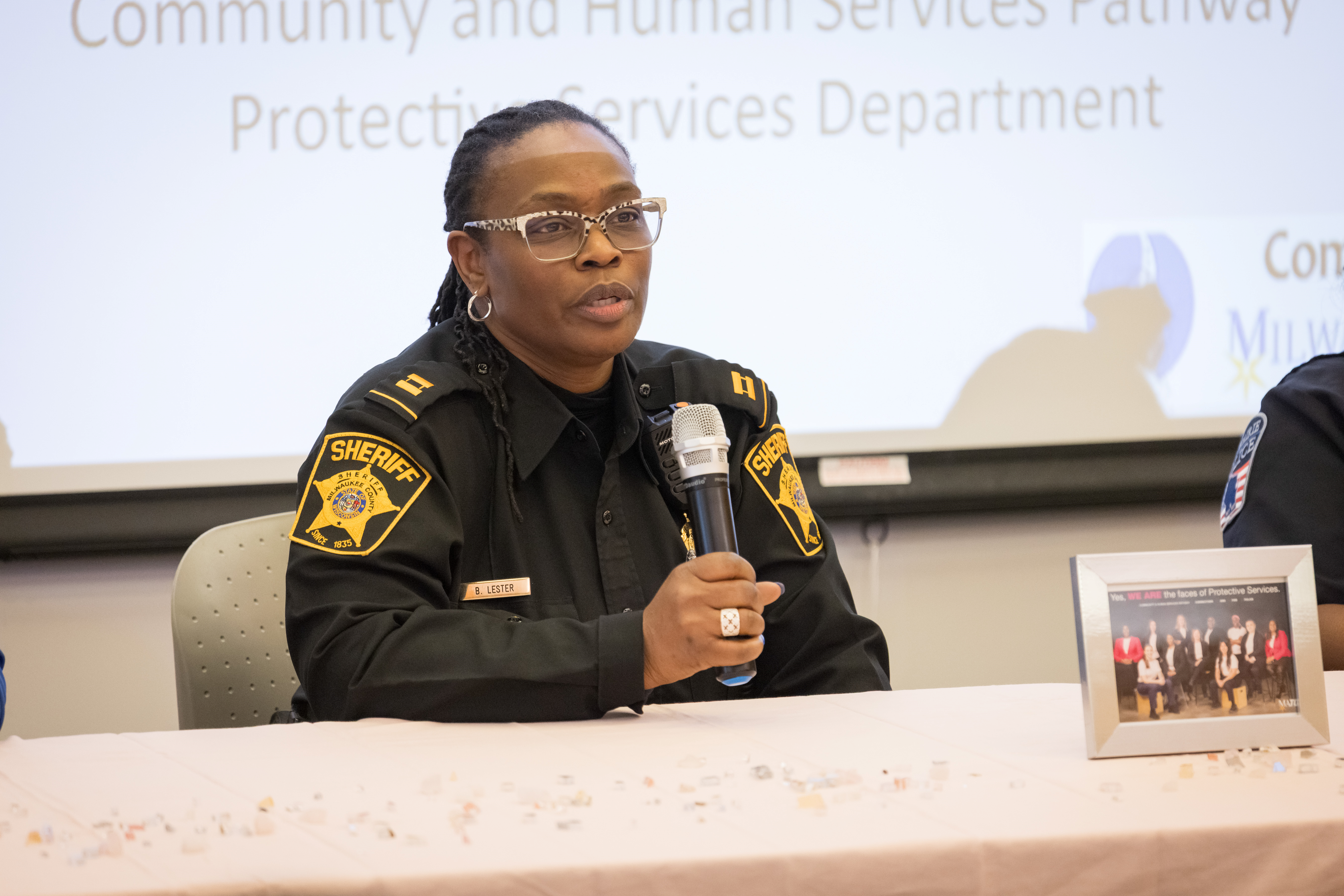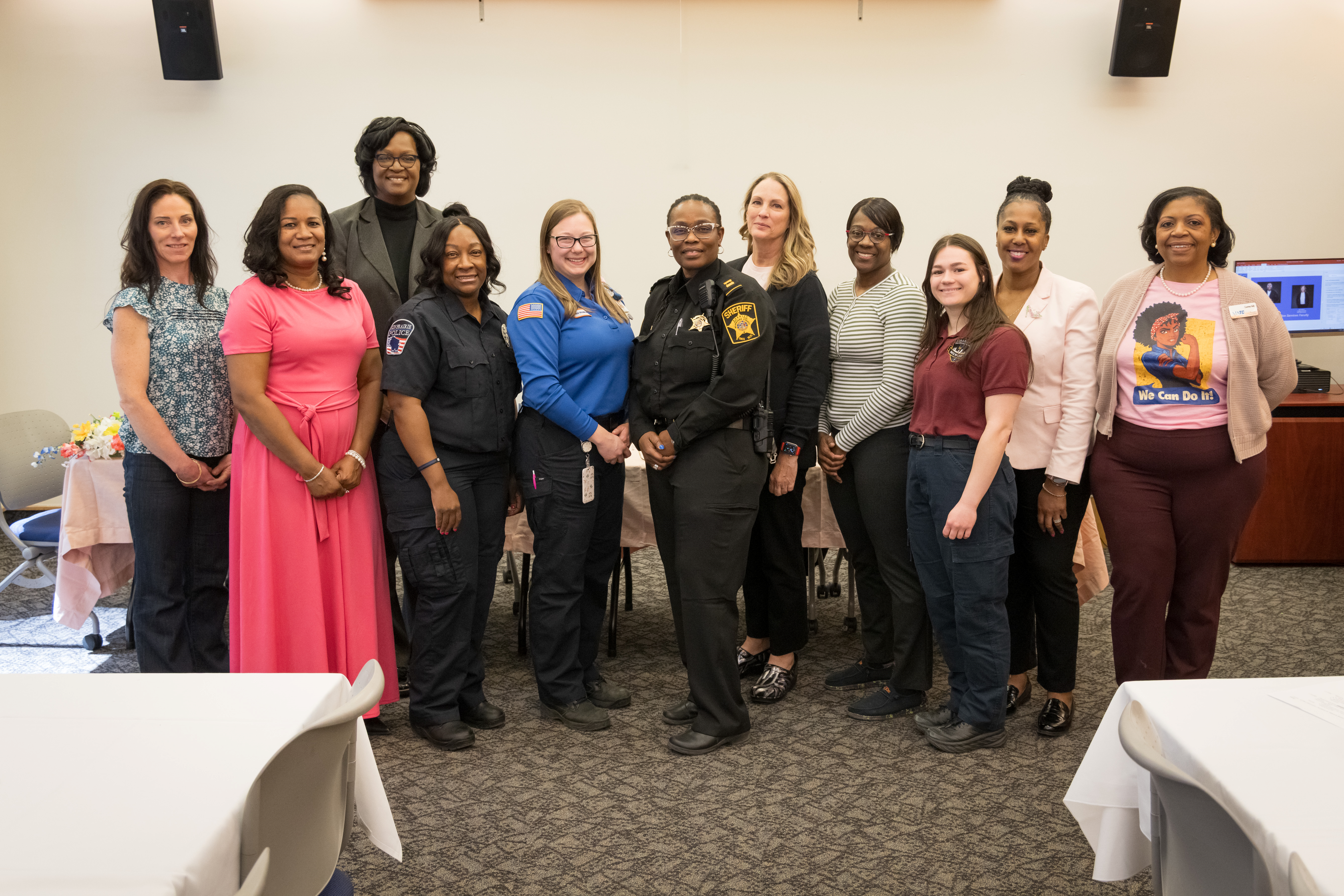
Don’t let anyone tell you you can’t make it. But if you want it, you have to work for it and use all the resources you can find. You have to know that everyone has a right to be at this table.
Capt. Brandy Lester didn’t beat around the bush.
Working 30 years for the Milwaukee County Sheriff’s Office hasn’t been easy.
Coming through the ranks, she continuously faced questions about her intelligence and ability while trying to serve and protect county residents.
“Being a female in this field is hard,” said Lester, who was promoted to captain two years ago. “Sometimes your passion for the job gets confused with being an angry Black female. The people I work with don’t have to like me, but I tell them ‘you will respect what I bring to the table.’”
Lester was speaking at a panel discussion held Tuesday, March 25, at Milwaukee Area Technical College. The theme was women in protective services careers: emergency medical services, criminal justice, fire training and corrections.
On the panel with Lester was Shamika Anderson, the first Black female patrol officer at the Sun Prairie Police Department; Nicole Fricano, an MATC Paramedic Technician student; and Tasha Kirch, currently the only Black female fire science instructor at MATC.
The women discussed how they got into their fields, the barriers and challenges they face while working, and what they hope to accomplish in their careers.
Fricano got interested in rescuing and treating people while working as a teenage lifeguard at Menomonee Park’s quarry lake in Waukesha County. “People would get hurt, and the ambulance would come and take them away,” she said. “I always wondered what was going on in the back of that ambulance.”
Fricano earned a degree in civil engineering from the University of Minnesota and worked for several years before enrolling in MATC’s Paramedic Technician program. She’s working at Bell Ambulance as a trainer and on track to graduate from MATC in May.
“I know that I enjoy this a whole lot more than watching construction crews at a work site,” she said.
Anderson drove a city bus for six years before deciding to join the police force. “I figured it couldn’t be much different, and I’d get to protect myself,” she said with a laugh.
On the job, she encountered some of the same challenges that Lester did. “I have learned to stand my ground,” Anderson said. “I can’t be quiet. I’m not going to take any disrespect.”
Kirch grew up in a low-income housing development in Madison. In 1990, the complex caught fire, and she watched five children die in the blaze. “One of them was 9 years old and I was 9 years old,” she recalled. “I watched the chaos unfold.”
The panelists also related how they balance their lives while working in a high-stress field. Lester suffered a heart attack two years ago, caused mostly by stress. Along with working, Lester earned degrees in Police Science (now Criminal Justice Studies) and Registered Nursing from MATC, raised a family, and helped take care of her grandchildren.
“I learned I’m not superwoman,” she said. “I learned you have to have time to decompress and to relax. It took me only 28 years to figure that out.”
Kirch said she watched horror movies with her son to blow off steam. Anderson attends church. Fricano coaches sports. “I try to find things that are totally outside of the field,” she said. “That’s the only way to get away from it.”
 Less than 25% of all first responders in the United States are women, said Janell Jones, associate dean of MATC’s Community and Human Services Academic and Career Pathway, which includes the Protective Services programs. And even fewer of them are Black women and women of color, she said.
Less than 25% of all first responders in the United States are women, said Janell Jones, associate dean of MATC’s Community and Human Services Academic and Career Pathway, which includes the Protective Services programs. And even fewer of them are Black women and women of color, she said.
The stories and information from the panelists hopefully will educate and inspire other women to enter these fields, said Courtney Kelly, the college’s career services coordinator.
“Don’t let anyone tell you you can’t make it,” Lester said. “But if you want it, you have to work for it and use all the resources you can find. You have to know that everyone has a right to be at this table.”
Milwaukee County Sheriff Denita R. Ball, who was in the audience, totally agreed. “It’s all about attitude, how you approach things,” said Ball, who was elected the county’s first Black female sheriff in 2022. “You might have a switch and people will look to flip that switch. You need to manage yourself.”
Learn about MATC’s Protective Services programs
About MATC: As Wisconsin’s largest technical college and one of the most diverse two-year institutions in the Midwest, Milwaukee Area Technical College is a key driver of southeastern Wisconsin’s economy and has provided innovative education in the region since 1912. More than 30,000 students per year attend the college’s four campuses and community-based sites or learn online. MATC offers affordable and accessible education and training opportunities that empower and transform lives in the community. The college offers more than 180 academic programs — many that prepare students for jobs immediately upon completion and others that provide transfer options leading to bachelor’s degrees with more than 40 four-year colleges and universities. Overwhelmingly, MATC graduates build careers and businesses in southeastern Wisconsin. The college is accredited by the Higher Learning Commission.


